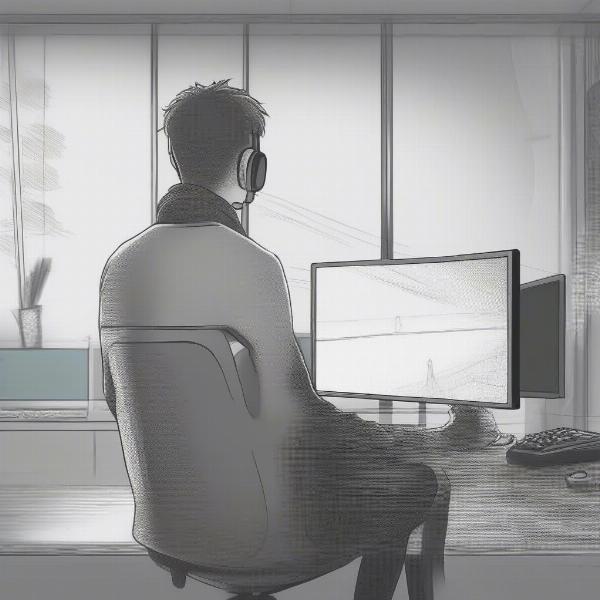The feeling of being trapped, of finding that you can’t get out of the game, is a chilling concept that’s increasingly relevant in our digital age. At SupremeDuelist.blog, we delve into the intricate relationship between virtual worlds and our real lives, exploring the addictive designs and psychological hooks that keep players engaged, sometimes to a worrying degree. This article will dissect the reasons behind this phenomenon, discuss how games are evolving to capture our attention, and examine the blurred lines between digital entertainment and reality. We’ll also investigate potential strategies to regain control and find a healthier balance when these virtual worlds start feeling too inescapable.
 intense-gamer-absorbed-virtual-world
intense-gamer-absorbed-virtual-world
It’s no longer just about simple entertainment. The complexity and depth of modern games have created compelling environments that can, at times, feel more appealing than our day-to-day lives. This article explores the allure of these worlds, the methods developers use to maintain player engagement, and more importantly, how to discern when your virtual life is overshadowing your real one, providing some advice on finding that balance.
The Allure of the Virtual: Why Games Feel So “Real”
Modern games are incredibly immersive experiences. They offer complex narratives, vast open worlds, and a sense of progression and achievement that can be deeply satisfying. It’s easy to lose yourself in a meticulously crafted fantasy world, especially when it feels more engaging than your everyday routine.
These games often feature carefully designed reward systems, often referred to as “game loops,” which keep players invested through constant positive feedback. This can range from the dopamine rush of leveling up your character to the satisfaction of completing a challenging quest. The sense of progress, coupled with the feeling of control over your virtual avatar, is a powerful draw that contributes to making the games feel “real” and difficult to step away from. These systems are not malicious, but they are effective and designed to keep players in the game.
The Psychological Hooks: How Game Design Keeps You Playing
Game developers are adept at using psychology to keep players engaged. One common tactic is the use of “variable rewards,” where players don’t know exactly what reward they’ll receive, leading to a sense of anticipation and excitement, similar to gambling. This unpredictable reward cycle is very effective at maintaining long-term engagement.
Another technique involves the use of social interaction and community features. Games often allow you to play alongside your friends and build virtual communities, adding a social dimension to the game that increases its value and makes leaving that community feel like a real loss. The investment of time and effort into these relationships can create a powerful sense of obligation, further strengthening the feeling that you can’t get out of the game. This is similar to situations discussed in our article about where can i stream the ravens game, where the need to not miss out on the social interaction of live sports keeps viewers engaged.
Escapism and the “Perfect World”
For some, games offer a much-needed escape from the stresses and anxieties of real life. These virtual worlds can offer a sense of control and empowerment that is often lacking in our daily lives. In games, you’re the hero, the problem-solver, the one who makes the important decisions. This can be especially appealing to those struggling with real-world challenges. This escapism is often a core part of why you can’t get out of the game.
“Games often offer a predictable and controllable environment, which is extremely attractive to individuals who feel overwhelmed by the chaos of everyday life,” says Dr. Evelyn Reed, a leading expert in gaming psychology. “The structured rules and clear objectives provide a sense of order and accomplishment that may be absent in their real lives, which can lead to an intense emotional attachment.”
 game-loop-reward-cycle
game-loop-reward-cycle
When the Game Becomes Too Real: The Warning Signs
It’s essential to recognize when your gaming habits are becoming unhealthy. One key sign is when you start prioritizing your virtual life over your real life, neglecting responsibilities, social interactions, and your own well-being.
Another warning sign is experiencing withdrawal symptoms when you can’t play. These could include irritability, anxiety, and restlessness. If you find that you’re thinking about the game constantly and feel compelled to return to it as soon as possible, it might be time to reassess your relationship with gaming. It is important to also recognize how game design itself may hinder you from uninstalling the game, and if you are experiencing issues uninstalling games, you may find our article on why can’t i uninstall xbox game bar useful.
The Blurred Line Between Reality and Game
When you start losing track of time while gaming or begin to confuse the boundaries between the game world and reality, it’s a major red flag. This can manifest as difficulty separating in-game events from real-life situations, or feeling an intense sense of loss or anxiety when not engaged in the game. This can lead to the feeling that you can’t get out of the game, because it feels like you are always still engaged in the game world, even when not actively playing.
Strategies for Regaining Control: Finding a Healthy Balance
The good news is that it’s possible to regain control and establish a healthier relationship with gaming. A great first step is to set time limits and stick to them. Use timers, and be firm with yourself. Creating a structured schedule for both gaming and real life activities can help you keep everything in perspective.
It’s also crucial to find hobbies and activities that are enjoyable and rewarding outside the digital world. Reconnecting with old interests or trying something new can be a powerful way to break free from the pull of the game. Spending time with friends and family and creating real world connections, rather than only virtual ones, are also vitally important. If you do decide to return to in-person activities, don’t worry about things like can you return opened games to target as your real life interaction is now a priority.
Seeking Support
If you’re struggling to manage your gaming habits, don’t hesitate to seek support from friends, family, or a mental health professional. They can offer valuable insights and guidance and help you get to a better place with your habits. Remember, acknowledging that you might need help is a sign of strength, not weakness.
“Taking regular breaks is crucial to maintaining perspective,” advises Dr. Amelia Chen, a clinical psychologist specializing in gaming addiction. “Even short periods of time away from the game can help you reconnect with the real world, allowing you to re-evaluate and manage your engagement in a more balanced manner.”
 gamer-pauses-game-returns-reality
gamer-pauses-game-returns-reality
The Future of Gaming: Navigating the Blurred Lines
As games continue to evolve, the lines between the virtual and real world will become even more blurred. This requires a conscious and proactive approach to gaming, focusing on self-awareness and personal responsibility. We, as players, need to be able to identify and manage how games affect our thoughts and actions.
It’s also crucial for game developers to design their games with player well-being in mind. This includes implementing safeguards, such as time limit reminders, and ensuring that game loops are not overly manipulative. Open communication with players about responsible gaming is also essential. Games are not inherently bad, but their potential for creating excessive escapism is real, and understanding this potential is key to navigating the modern gaming landscape. If you are having issues watching a game, it is always important to ensure that these issues are related to real world elements, not virtual ones, such as how to resolve an issue with why can’t i watch the cowboys game. It’s about the approach that we take.
Ultimately, the goal is to enjoy games for their entertainment value without allowing them to take over our lives. Finding a healthy balance requires self-awareness, boundaries, and a commitment to prioritizing real-world experiences. The feeling that you can’t get out of the game should be a wake-up call, not a permanent state of being. If you are struggling with feeling trapped, it is also worth remembering that issues that may feel like they are stopping you from watching live games, like why can’t i watch the phillies game, can be resolved.
In conclusion, the experience of feeling that you can’t get out of the game highlights the complex relationship between virtual and real-world experiences in modern gaming. This article has provided an in-depth analysis into the psychological hooks and immersive game design that create this feeling, as well as strategies to regain control and find a healthier balance. Here at SupremeDuelist.blog, we’re committed to providing valuable insights to help you navigate the exciting, yet potentially challenging, world of gaming. Remember, it’s all about enjoying the game, while ensuring the game doesn’t end up playing you.
Leave a Reply